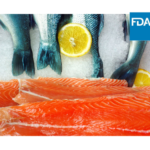The US FDA revised the current Compliance Policy Guide on Decomposition and Histamine in Raw, Frozen Tuna and Mahi-Mahi, Canned Tuna, and related species of Fish regarding the levels of histamine in fish. Histamine is a chemical that accumulates in the fish tissue during decomposition after the death of fish and when not properly chilled or treated to prevent further microbial activity. Ingestion of food with high levels of histamine causes poisoning.
The fish samples with 35 ppm or more (lowered from 50 ppm), may be considered adulterated because they are decomposed or produced under insanitary conditions. Also, at histamine levels of 200 ppm (lowered from 500 ppm) the fish may be considered adulterated based on the presence of a deleterious substance (histamine), which renders them injurious to health. The elevated histamine levels can be prevented by following GMP & HACCP required in the distribution chain.
Read the draft here.






